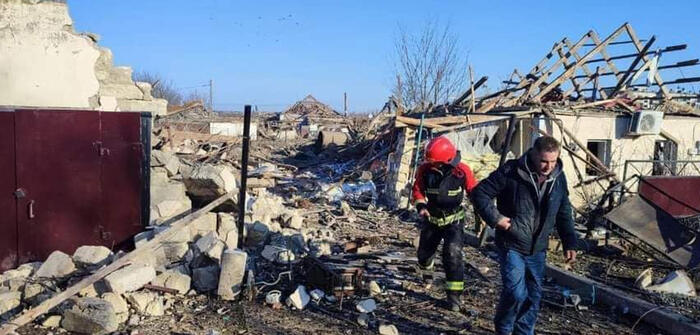Icon: enlarge
Isar I and Isar II nuclear power plants: One of the two reactors has already been decommissioned and will be dismantled, the other must be decommissioned by the end of 2022 at the latest.
Photo: Martin Siepmann / imagebroker / imago images
No effective climate protection without nuclear power.
In a nutshell, that is Rafael Grossi's message.
The Argentine has been head of the International Atomic Energy Agency (IAEA) in Vienna for around a year - and is currently in Berlin for political talks.
So he gave some interviews beforehand.
Grossi's organization takes care of, among other things, the fight against the proliferation of nuclear weapons, for example by monitoring the Nuclear Non-Proliferation Treaty and the nuclear agreement with Iran.
During his visit to Germany, Grossi also spoke about what, from his point of view, the important role of nuclear power in the fight against man-made climate change.
One of his messages: The end of nuclear energy in Germany, decided for 2022, is politically legitimate, but not scientifically justifiable with regard to the climate and the two-degree target.
"The scientific fact is that nuclear power plants cause extremely low carbon dioxide emissions," said Grossi of the German press agency.
It is a fact that a third of clean energy comes from nuclear sources.
Citing the Intergovernmental Panel on Climate Change (IPCC) and the International Energy Agency (IEA), Grossi said: "Any way to achieve the 2-degree threshold set in the Paris Agreement is almost impossible without nuclear power."
"Nuclear power is part of the solution," is Grossi's mantra.
That the head of the International Atomic Energy Agency is promoting nuclear power may not come as a surprise.
But it may be worth listening to.
Nuclear reactors, he argues, offer a stable power supply that can support less constant renewable electricity from wind, water or sun.
"Without nuclear energy, CO2 emissions would multiply," Grossi told the FAZ.
Disposal issue remains largely unresolved
Climate protectors critical of nuclear power, however, complain that expanding nuclear power in the name of climate protection is expensive and inefficient.
"We have to be CO2-neutral by the middle of the century. Not even enough reactors can be built that quickly to replace those nuclear power plants that will expire before 2050," criticized Paul Dorfman from University College London some time ago in SPIEGEL .
Dorfmann is the chairman of the "Nuclear Consulting Group", an international group of experts and activists who deal with questions of nuclear energy and radiation medicine, the proliferation of nuclear weapons and the sustainability of energy systems.
The Intergovernmental Panel on Climate Change has also dealt with a possible role of nuclear power in climate protection.
The panel's experts had already made it clear in 2014 that the world must say goodbye to oil, gas and coal - and instead needs low-carbon technologies for generating electricity.
In addition to wind, solar, water and biomass, the IPCC also expressly included nuclear power.
However, in this context, the Council also noted that greater efforts are needed to address nuclear safety, the disposal of nuclear waste and other risks.
"People prefer a solution that doesn't get them near trash."
Rafael Grossi, IAEA Director General
Finland is so far the only country that is building a nuclear repository.
Sweden also recently approved a location, according to Grossi.
"We have postponed a problem until it is impossible not to address it".
People's resistance to knowing such material around them is understandable, he said.
"People prefer a solution that doesn't get them near trash."
A long-term process is currently underway in Germany to find the location for a repository.
In a first step, 90 areas that are in principle suitable were identified.
The German phase-out of nuclear power is practically unique in the world in terms of its consistency and speed, and it is a really special path, according to Grossi.
Only a few countries would have decided to exit.
Others sought a reduction in nuclear power, but not an exit.
Otherwise there is a remarkable trend towards nuclear expansion - be it in China, Russia, India, South Africa, Turkey, Bangladesh, Vietnam, the United Arab Emirates, Egypt, Argentina or Brazil, according to the IAEA chief.
However, the last world status report on atomic energy, an annual analysis of the state of the industry, came to the conclusion that the importance of nuclear power is declining worldwide.
Nevertheless, various countries remain loyal to the technology.
Japan, for example, continues to rely on nuclear power.
The country has just announced that it intends to become climate neutral by 2050, i.e. to bring total greenhouse gas emissions to zero by then.
In his announcement, the new Prime Minister Yoshihide Suga said that nuclear power plants should play a role alongside renewable energies.
Safety is a priority.
Icon: The mirror
chs / dpa











